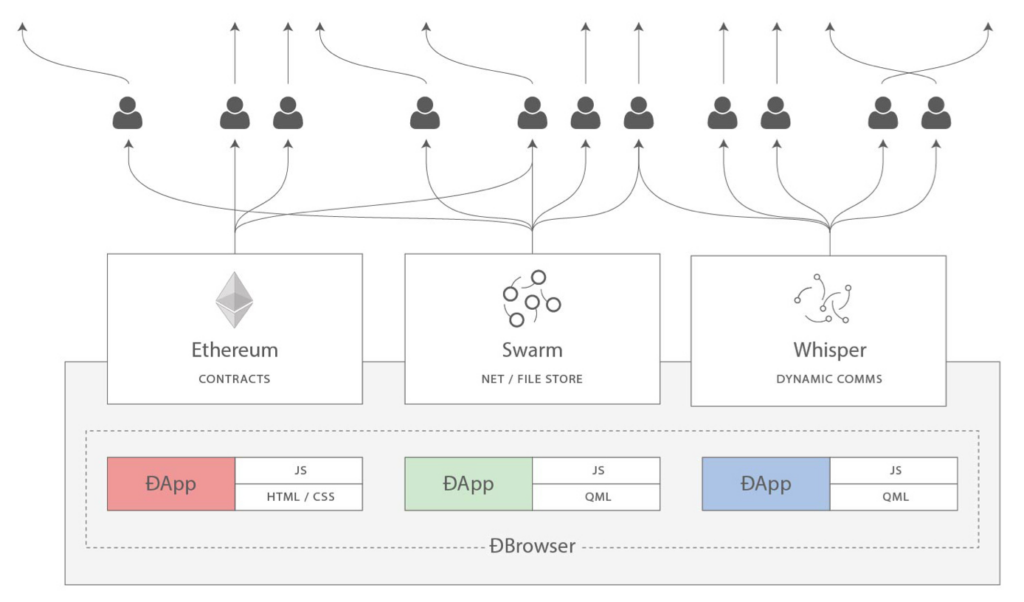2023 edition of trends in Blockchain and Web3. A previous version of this research has been published in Blockchain Technology Report, by Vienna Business Agency (2022). This post is an updated version from 2023.
Since the creation of Bitcoin and the first blockchain in 2009, many established industry sectors have made use of this technology to various degrees and in different forms. In the past ten years of blockchain, a lot has been discussed, revolutionized, sanctioned and regulated (remember ICO, the first NFTs, and Parachains?) — while the general sentiment is divided into either radical Bitcoiners, or more promiscuitive Blockchainers. The idea of “Blockchain, not Bitcoin”((Levin, J. (2014). ‘I Love the Blockchain, Just Not Bitcoin’. [online] @coindesk. Available at: https://www.coindesk.com/markets/2014/11/16/i-love-the-blockchain-just-not-bitcoin/ [Accessed 2 Jul. 2022].)) exists since 2014, and has met its most extreme point when former Twitter CEO Jack Dorsey claimed he wants to launch Web5((POLITICO (2022). Celsius meltdown and the rise of Web … 5? [online] POLITICO. Available at: https://www.politico.com/newsletters/digital-future-daily/2022/06/13/celsius-meltdown-and-the-rise-of-web-5-00039277 [Accessed 2 Jul. 2022].)) based on Bitcoin in June 2022.
While there are many use-cases imaginable, the financial services industry is the one probably most affected and transformed, with DeFi (decentralized finance) and the Open Finance movement being prominent examples. The main trend of blockchain use lies in the finance sector, with examples such as the previous attempts in developing Libra (Meta, previously Facebook has ended the Libra Saga in July 2022 finally((Napolitano, E. (2022). Meta to Shutter Novi Crypto Payments Wallet in September, Ending Libra Saga. [online] @coindesk. Available at: https://www.coindesk.com/business/2022/07/01/meta-to-shutter-novi-crypto-payments-wallet-in-september-ending-libra-saga/ [Accessed 2 Jul. 2022].))).
RIAT Institute for Future Cryptoeconomics has quantified trends in Blockchain.

Data sovereignty
Data sovereignty refers to the greatest possible control and command of one’s own data. This concept involves being able to handle one’s personal data in a self-determined way. Web3 enables its developers and users to potentially achieve data sovereignty. It also enables companies to process personal data in compliance with the GDPR. Topics within this trend include digital identity (self-sovereign identity) and data marketplaces. In the context of the global coronavirus pandemic, the Chaos Computer Club (CCC) and the Foundation for Data Protection in Germany warn against COVID-19 tracing apps((Chaos Computer Club (2020). CCC | Corona-Tracing-App: Offener Brief an Bundeskanzleramt und Gesundheitsminister. [online] Available at: https://www.ccc.de/de/updates/2020/corona-tracing-app-offener-brief-an-bundeskanzleramt-und-gesundheitsminister [Accessed 2 Jul. 2022].)). The debate around PEPP-PT and DP3T technologies((Powers, B. (2020). European Contact Tracing Consortium Faces Wave of Defections Over Centralization Concerns. [online] @coindesk. Available at: https://www.coindesk.com/policy/2020/04/20/european-contact-tracing-consortium-faces-wave-of-defections-over-centralization-concerns/ [Accessed 2 Jul. 2022].)) has significantly increased public awareness of data sovereignty in the health sector.
IoT and Blockchain
The Internet of Things has been a trending topic for many years, but it has so far failed to achieve broad distribution. The IoT connects people, places, and products and opens up new possibilities for added value. Blockchain could provide the breakthrough moment for the Internet of Things, especially when machines are considered to be their own economic agents. Topics within this trend include open-source hardware, machine agency and NFT (Non-Fungible Token). In 2024 the term “DePin” (an acronym for Decentralized Physical Infrastructure Networks) marks the rise of IoT in the blockchain space.
Fractional ownership
Fractional ownership refers to the option of distributing risks and separating resources from assets such as land or artworks. Although the term has been around for some time, it is only recently that this method has been used in the context of blockchain. Predominately, blockchain has tried to manifest in the real estate sector, but increasingly in the areas of art and luxury goods as well. Decentralized governance also allows for possibilities such as distributed resource management. Democratic processes can be applied to these shared resources through e-voting. The decentralized method provides a means of managing common property (commons). Sub-topics include decentralized autonomous ownership and smart commons.